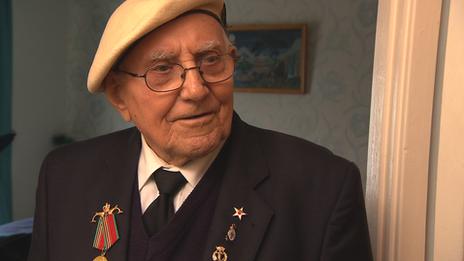Essex soldier from Arctic convoys denied Russian medal
- Published

A serviceman who sailed on convoys to Arctic Russia in World War II has been denied a campaign medal.
Fred Henley, from Clacton, Essex, was to be awarded the Ushakov Medal by Russia but the offer was withdrawn after intervention by the UK Government.
Whitehall officials said the honour went against rules governing medals given by other countries.
Mr Henley described the government's action as "insulting".
He had taken part in the convoys which delivered aircraft, tanks, munitions and food during the darkest days of the war.
Crews fought enemy submarines, aircraft and the atrocious weather.
Mr Henley said: "As we got up into the Arctic Circle things got really bad. We had attacks by German bombers from Norway.
"There were U-boats strung about the area but the main thing was the cold.
"Ice formed on the superstructure which we had to chip off to keep the ship stable".
Last year he received a letter from the Russian Embassy offering him the Ushakov Medal for his courage in the Arctic.
A few weeks later, he received another letter from the Russians, saying the Foreign Office had blocked the presentation.
Mr Henley was angry and said: "I thought it was insulting".
The Russians had to get permission from the Foreign and Commonwealth Office to present the award and this had not been given.
In its letter to Mr Henley, the Russian Embassy said it was with deep regret they could no longer make the award because of "British red tape".
The Russian Embassy in London said: "This decision gives us grounds for deep regret. We hope that the British authorities will reconsider this bureaucratic formality and review their position."
The Foreign and Commonwealth Office (FCO) said: "Rules on the acceptance of foreign awards clearly state that in order for permission to be given for an award to be accepted, there has to have been specific service to the country concerned within the previous five years.
"Additionally, permission cannot be granted if they have received, or are expected to receive, a UK award for the same services.
"All British Veterans of the convoys were eligible for the Atlantic Star.
"A lapel badge (the Arctic Emblem) was introduced in 2006 and some 10,000 have been issued."
American and Commonwealth servicemen who fought alongside the Russians or were on Arctic convoys have received Ushakov Medals without objections from their governments but no British citizen has been able to receive the honour.
'Russians know the rules'
Cyril Banks, from Bishop's Stortford in Hertfordshire, also served on the Arctic convoys and was told he would receive the Ushakov medal and then it was withdrawn.
But he was also presented with the Legion d'Honneur from France in 2012 for clearing mines for the Normandy landings almost 70 years ago.
The French were allowed to award their medal but the Russians were denied.
The FCO said: "A general award has already been made by Russia and when this exception was allowed it was announced that there would be no others. The Russians should know the rules."
In April 2012, Prime Minister David Cameron asked leading diplomat Sir John Holmes to review the policy on military medals as regulations are not always strictly enforced.
Sir John has recommended that there should now be a fresh look at the policy on the acceptance of foreign awards.
Fred Henley's story is told on Inside Out Monday BBC1 7.30pm